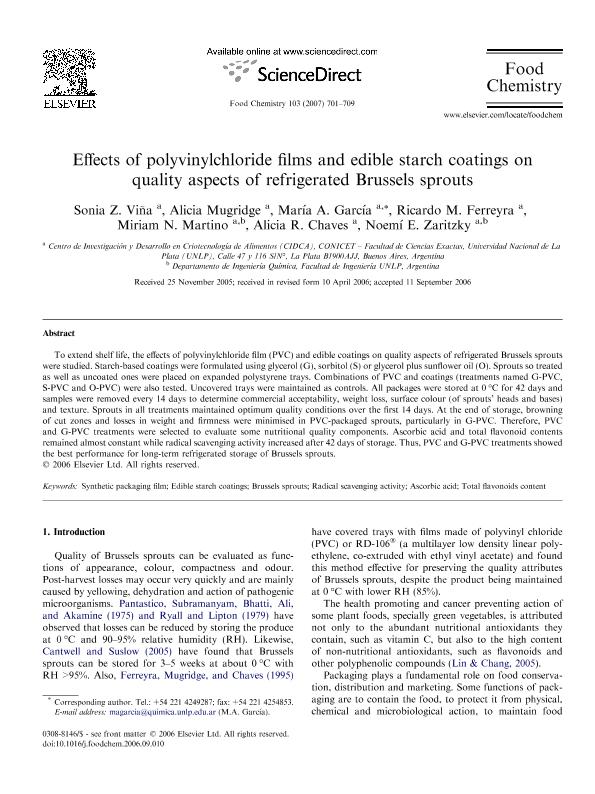Artículo
Effects of polyvinylchloride films and edible starch coatings on quality aspects of refrigerated Brussels sprouts
Viña, Sonia Zulma ; Mugridge, Alicia
; Mugridge, Alicia ; Garcia, Maria Alejandra
; Garcia, Maria Alejandra ; Ferreyra, Ricardo M.; Martino, Miriam Nora
; Ferreyra, Ricardo M.; Martino, Miriam Nora ; Chaves, Alicia Raquel
; Chaves, Alicia Raquel ; Zaritzky, Noemi Elisabet
; Zaritzky, Noemi Elisabet
 ; Mugridge, Alicia
; Mugridge, Alicia ; Garcia, Maria Alejandra
; Garcia, Maria Alejandra ; Ferreyra, Ricardo M.; Martino, Miriam Nora
; Ferreyra, Ricardo M.; Martino, Miriam Nora ; Chaves, Alicia Raquel
; Chaves, Alicia Raquel ; Zaritzky, Noemi Elisabet
; Zaritzky, Noemi Elisabet
Fecha de publicación:
01/2007
Editorial:
Elsevier
Revista:
Food Chemistry
ISSN:
0308-8146
e-ISSN:
1873-7072
Idioma:
Inglés
Tipo de recurso:
Artículo publicado
Clasificación temática:
Resumen
To extend shelf life, the effects of polyvinylchloride film (PVC) and edible coatings on quality aspects of refrigerated Brussels sprouts were studied. Starch-based coatings were formulated using glycerol (G), sorbitol (S) or glycerol plus sunflower oil (O). Sprouts so treated as well as uncoated ones were placed on expanded polystyrene trays. Combinations of PVC and coatings (treatments named G-PVC, S-PVC and O-PVC) were also tested. Uncovered trays were maintained as controls. All packages were stored at 0 °C for 42 days and samples were removed every 14 days to determine commercial acceptability, weight loss, surface colour (of sprouts’ heads and bases) and texture. Sprouts in all treatments maintained optimum quality conditions over the first 14 days. At the end of storage, browning of cut zones and losses in weight and firmness were minimised in PVC-packaged sprouts, particularly in G-PVC. Therefore, PVC and G-PVC treatments were selected to evaluate some nutritional quality components. Ascorbic acid and total flavonoid contents remained almost constant while radical scavenging activity increased after 42 days of storage. Thus, PVC and G-PVC treatments showed the best performance for long-term refrigerated storage of Brussels sprouts.
Archivos asociados
Licencia
Identificadores
Colecciones
Articulos(CIDCA)
Articulos de CENTRO DE INV EN CRIOTECNOLOGIA DE ALIMENTOS (I)
Articulos de CENTRO DE INV EN CRIOTECNOLOGIA DE ALIMENTOS (I)
Citación
Viña, Sonia Zulma; Mugridge, Alicia; Garcia, Maria Alejandra; Ferreyra, Ricardo M.; Martino, Miriam Nora; et al.; Effects of polyvinylchloride films and edible starch coatings on quality aspects of refrigerated Brussels sprouts; Elsevier; Food Chemistry; 103; 3; 1-2007; 701-709
Compartir
Altmétricas



